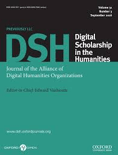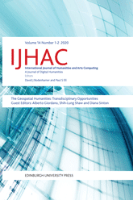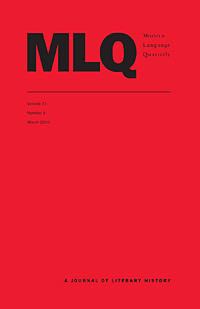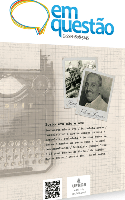
Digital Scholarship in the Humanities
Scope & Guideline
Fostering Interdisciplinary Connections through Digital Scholarship.
Introduction
Aims and Scopes
- Digital Methodologies and Tools:
The journal emphasizes the development and application of digital tools and methodologies, such as text mining, data visualization, and computational analysis, to enhance research in the humanities. - Interdisciplinary Collaboration:
It fosters collaboration between traditional humanities scholars and experts in computer science, linguistics, and data science to create new frameworks for understanding cultural and literary texts. - Cultural Heritage and Preservation:
The journal addresses issues related to the digital preservation of cultural heritage, including the digitization of historical texts and artifacts, ensuring their accessibility for future generations. - Critical Examination of Digital Practices:
A unique contribution of the journal is its focus on critically examining the implications of digital scholarship, including questions of representation, bias, and ethical considerations in digital humanities research. - Pedagogical Innovations:
It also explores innovative pedagogical practices that incorporate digital tools in teaching humanities subjects, aiming to enhance learning experiences for students.
Trending and Emerging
- AI and Machine Learning Applications:
Recent publications highlight the integration of artificial intelligence and machine learning in analyzing texts, indicating a growing interest in leveraging these technologies for literary and linguistic research. - Data-Driven Approaches to Cultural Analysis:
There is an increasing focus on data-driven methodologies, including the use of big data analytics to explore cultural phenomena, which signifies a shift towards empirical research in the humanities. - Digital Activism and Social Justice:
Emerging themes include the role of digital humanities in social justice and activism, exploring how digital platforms can amplify marginalized voices and contribute to societal change. - Interactive and Immersive Digital Experiences:
The journal is also trending towards exploring interactive and immersive experiences in digital humanities, such as virtual reality and augmented reality applications, which enhance engagement with cultural heritage. - Ethics and Critical Reflections on Digital Practices:
A growing emphasis on the ethical implications of digital scholarship is evident, with researchers increasingly addressing bias, representation, and the responsibility of scholars in the digital age.
Declining or Waning
- Traditional Literary Analysis Techniques:
As digital methods gain traction, traditional literary analysis techniques, such as close reading and qualitative analysis, appear less frequently, suggesting a shift towards more quantitative and computational approaches. - Standalone Humanities Disciplines:
There is a noticeable decrease in articles focusing solely on individual humanities disciplines without the integration of digital tools, indicating a trend towards interdisciplinary work that combines multiple fields. - Historical Linguistics without Digital Tools:
Research in historical linguistics that does not engage with digital methodologies is becoming less common, as scholars increasingly adopt computational approaches to linguistic analysis.
Similar Journals

Dicenda-Cuadernos de Filologia Hispanica
Innovating Research in the Heart of Hispanic StudiesDicenda-Cuadernos de Filologia Hispanica, published by UNIV COMPLUTENSE MADRID, SERVICIO PUBLICACIONES, is a distinguished academic journal in the fields of linguistics, literature, and literary theory. Since its transition to Open Access in 2017, it has facilitated unrestricted dissemination of knowledge, making it an invaluable resource for researchers, scholars, and students interested in the rich tapestry of Hispanic philology. With an impact factor reflected by its Scopus rankings—at Q3 in Linguistics and Language and Q2 in Literature and Literary Theory—Dicenda serves as a vital platform for innovative research and critical discourse. The journal actively encourages submissions that explore contemporary and historical perspectives within its scope. Located in Madrid, Spain, the journal has steadily established itself as a significant contributor to the ongoing dialogue in the humanities, fostering a deeper understanding of linguistic and literary phenomena.

International Journal of Humanities and Arts Computing-A Journal of Digital Humanities
Exploring the Nexus of Digital Innovation and Human ExpressionInternational Journal of Humanities and Arts Computing - A Journal of Digital Humanities, published by Edinburgh University Press, is a pivotal platform that explores the intricate interplay between the humanities, arts, and digital technologies. With an ISSN of 1753-8548 and an E-ISSN of 1755-1706, this journal serves as a valuable resource for scholars investigating how digital tools transform humanistic research and artistic expression. Since its inception in 1996, the journal has evolved significantly, now positioned within the third and fourth quartiles in various categories including Arts and Humanities, Computer Science, and Human-Computer Interaction as of 2023. This demonstrates its growing relevance and impact in the digital humanities landscape. Although currently not an open-access journal, it offers a diverse range of studies that seek to enhance our understanding of digital methodologies and their implications in human culture, making it an essential read for researchers, professionals, and students alike interested in the synergy of technology and the humanities.

MODERN LANGUAGE QUARTERLY
Fostering Intellectual Rigor in Literary Analysis.MODERN LANGUAGE QUARTERLY, published by DUKE UNIVERSITY PRESS, stands as a premier journal in the field of Literature and Literary Theory, recognized for its intellectual rigor and scholarly contributions. With an impressive Scopus ranking of #156 out of 1106 in its category, the journal showcases an 85th percentile standing, indicating its significant impact within the academic community. The journal, with ISSN 0026-7929, focuses on critical analysis, literary theory, and the intersection of language and culture, making it an essential resource for researchers, professionals, and graduate students alike. As it converges from 1996 to 2024, MODERN LANGUAGE QUARTERLY continues to uphold its tradition of excellence in literary scholarship, contributing to the advancement of knowledge and fostering a deeper understanding of literature's role in society. With its Q1 ranking in 2023, this journal represents the forefront of literary studies, providing a vibrant forum for the exchange of ideas and innovative research in the humanities.

PAPERS OF THE BIBLIOGRAPHICAL SOCIETY OF AMERICA
Unveiling the Rich Tapestry of Bibliographical ScholarshipPapers of the Bibliographical Society of America, published by University of Chicago Press, is an esteemed scholarly journal that focuses on the realms of bibliographic research, literature, and literary theory. With a rich history dating back to its inception in 1941, this journal has evolved to cover a wide spectrum of bibliographical scholarship, drawing contributions from leading researchers and practitioners in the field. The journal holds a prominent position in the academic community, evidenced by its Q2 ranking in Literature and Literary Theory and Q3 ranking in Library and Information Sciences as of 2023, reflecting its rigorous academic standards and influence. Although it is not an open access journal, its publications are vital for those engaged in literary studies and library sciences, offering critical insights and fostering interdisciplinary discussions. The journal's unique intersection of literature and bibliographic analysis makes it an invaluable resource for scholars, professionals, and students seeking to deepen their understanding of texts and their historical contexts.

Em Questao
Navigating the Future of Library Science and CommunicationEm Questao is an esteemed open-access journal dedicated to the fields of library science and communication studies, published by the Universidade Federal do Rio Grande do Sul, specifically through its esteemed Faculdade de Biblioteconomia e Comunicação. Since its inception in 2003, this journal has provided a platform for researchers, professionals, and students to disseminate influential scholarly work that fosters dialogue and innovation within these critical academic domains. Em Questao strives to enhance the visibility of emerging trends and methodologies in library science and communication, making it an indispensable resource for those looking to navigate the complexities of information dissemination in today's digital landscape. With a commitment to open access, it ensures that knowledge is readily available to a global audience, contributing to the advancement of these vital fields. Researchers interested in exploring insightful analyses and fostering collaborative research will find Em Questao a valuable addition to their academic resources.

Anales de Filologia Francesa
Connecting Researchers Through Open Access KnowledgeAnales de Filologia Francesa is a prominent academic journal dedicated to the fields of French philology, linguistics, and literature, published by UNIV MURCIA. Since its transition to open access in 1985, this journal has enabled a wider dissemination of knowledge, fostering scholarly communication among researchers, professionals, and students alike. Based in Spain, Anales de Filologia Francesa plays a pivotal role in addressing current issues and advancements within its scope, underscored by its notable rankings within the Scopus database, where it places in the second and third quartiles across various disciplines related to literature and linguistics. With a commitment to publishing high-quality research, this journal is essential for those looking to engage with cutting-edge studies in French literary theory, language use, and educational practice.

Perspectives-Studies in Translation Theory and Practice
Empowering Researchers Through Rigorous ScholarshipPerspectives-Studies in Translation Theory and Practice, a leading journal published by Routledge Journals, Taylor & Francis Ltd, serves as a pivotal platform for the exploration of translation studies, fostering dialogue among researchers, professionals, and students in the fields of cultural studies, linguistics, and literature. Established in 1996, this esteemed journal has consistently maintained its position within the Q1 quartile in both cultural studies and linguistics, thanks to its rigorous peer-review process and dedication to high-quality scholarship. With an impressive ranking of 6th out of 1106 in Arts and Humanities Literature and Literary Theory on Scopus, Perspectives stands out as a vital resource for those seeking to enrich their understanding and engage with evolving translation theories and practices. The journal is not open access, yet it remains influential in shaping discourse and advancing knowledge within its dynamic and interdisciplinary field. Researchers and students alike will find valuable insights in its contributions, making it an essential addition to any academic library.

Studi irlandesi-A Journal of Irish Studies
Illuminating Ireland's Global InfluenceStudi Irlandesi - A Journal of Irish Studies, published by FIRENZE UNIV PRESS, stands as a pivotal platform for the dissemination of scholarly research in the field of Irish Studies. With its Open Access model established since 2011, the journal facilitates the global exchange of knowledge and ideas, catering to researchers, professionals, and students with an interest in Ireland's rich cultural, historical, and literary heritage. The ISSN for the journal is 2239-3978, ensuring easy accessibility for those engaged in contemporary Irish studies. This journal not only aims to advance academic discourse but also serves as a crucial resource for interdisciplinary analysis surrounding Irish identity and its global impacts. As an essential publication within its field, Studi Irlandesi invites contributions that enhance understanding of Ireland’s complexities and its contributions to world culture.

Digital Humanities Quarterly
Pioneering new pathways in digital humanities research.Digital Humanities Quarterly, published by the Alliance Digital Humanities Organizations, is a leading open-access journal since 2007, dedicated to advancing research at the intersection of digital technologies and the humanities. With a noteworthy ISSN of 1938-4122, this journal serves as a vital platform for scholars engaging in innovative digital methodologies across diverse fields, including arts and humanities, communication, library sciences, and computer networks. Over its converged years from 2018 to 2024, it has earned impressive rankings, notably being placed in Q2 among peers (2023) in Arts and Humanities, Communication, and Library and Information Sciences. With an impact on critical discourse and practice in digital scholarship, Digital Humanities Quarterly is essential for researchers, professionals, and students aiming to understand and contribute to this dynamic field. The journal is based in the United States at Snell Library 213, Northeastern University, Boston, MA 02115, and strives to connect a global audience through its unrestricted access model.

Open Library of Humanities
Connecting Scholars to Transformative IdeasThe Open Library of Humanities, a premier platform established in 2015 and based in the United Kingdom, elevates the discourse in the fields of Anthropology, Arts and Humanities, Cultural Studies, and Sociology and Political Science. Published by OPEN LIBRARY OF HUMANITIES, this open access journal provides a prominently accessible space for scholars and researchers to disseminate their findings and contribute to a diverse range of academic conversations. With an impressive Scopus ranking that reflects its influence—ranking in the 87th percentile in General Arts and Humanities and in the 80th percentile for Cultural Studies—the journal is recognized for publishing high-quality research that addresses significant and contemporary issues within its scope. By embracing a multidisciplinary approach, the Open Library of Humanities fosters interdisciplinary dialogue and encourages innovative research dissemination practices. Scholars, students, and practitioners are invited to engage with the latest developments and theoretical insights that enrich our understanding of the human experience.